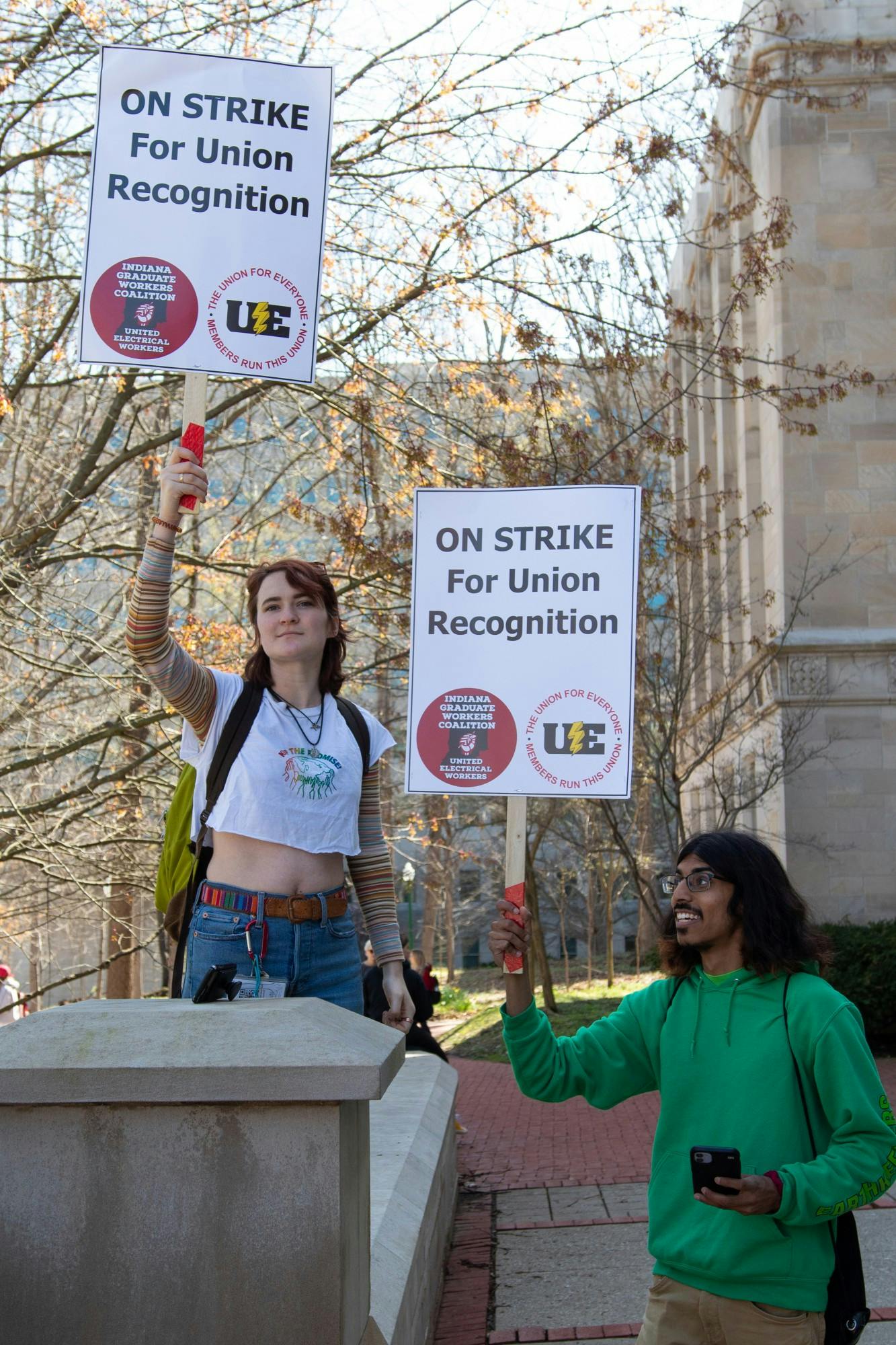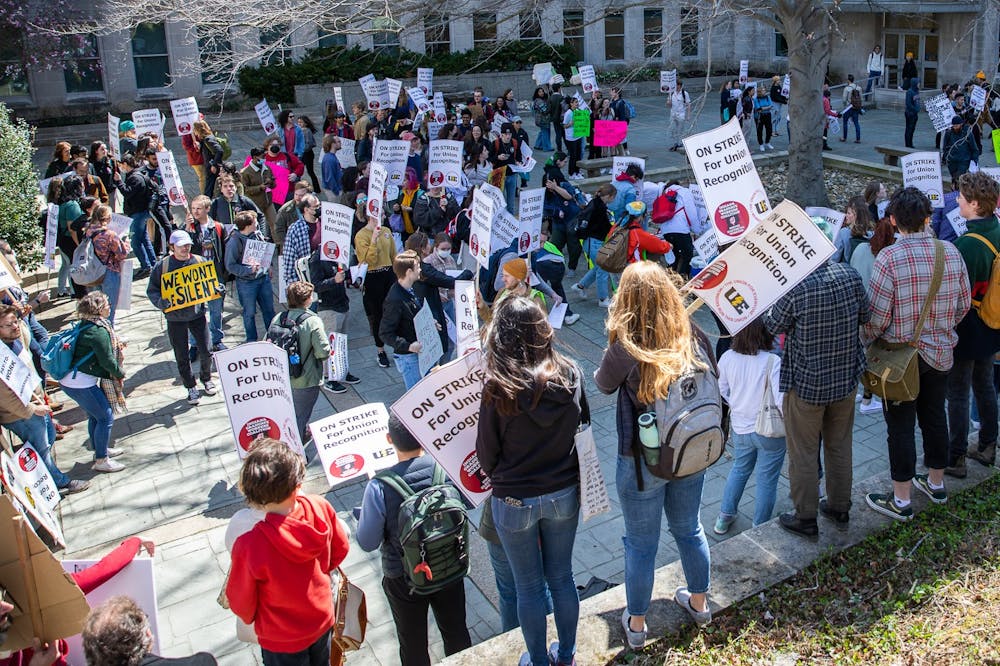After more than three years of protesting working conditions at IU which culminated last spring in a weekslong strike, members of the Indiana Graduate Workers Coalition-United Electrical Workers are now voting on whether to strike again starting this week. Since the last strike ended in May, IU has announced policy changes that address the IGWC-UE’s five main demands, but has withheld union recognition.
The Indiana Graduate Workers Coalition-United Electrical Workers formed in 2019 to fight for improved working conditions for graduate workers. IGWC-UE began pushing for union recognition last fall, after the March 2021 fee strike. IU rejected the IGWC-UE request for a union election last February, and still maintains this position.
Related: [Everything to know about the IU graduate worker strike]
Between Saturday and Monday, the IGWC-UE’s around 1,900 members will virtually vote whether to authorize another strike, which would start Tuesday. The Coordinating Committee, an elected group within the coalition, recommended Friday for members to vote against the strike. In a statement, the committee expressed hope that ongoing negotiations with Bloomington Faculty Council and the Graduate and Professional Student Government, which would last beyond the Monday strike vote deadline, would lead to partial union recognition this semester, making a strike unnecessary right now.
In May, the Bloomington Faculty Council voted in favor of recognizing the graduate workers union, passing two resolutions which IGWC-UE’s Twitter celebrated as victories. While the BFC lacks the power to recognize the union officially on behalf of the university — that decision falls to the Board of Trustees — the resolutions serve as a call to action for the IU community.
The first resolution asserts the power to reappoint student academic appointees — graduate students who hold part-time teaching or research appointments — belongs to departments, not the vice provost for faculty and academic affairs or the provost, and that no SAA will risk future reappointment for striking. Resolution 3B urged the Board of Trustees to arrange an election for union recognition and for IU administrators to talk immediately with IGWC-UE.
Despite the BFC’s encouragement, the Board of Trustees refused to recognize the graduate workers union in May in a letter to the BFC obtained by the Indiana Daily Student. The Board acknowledged working conditions for SAAs need improvements, but said a graduate workers union would be “incompatible” with IU’s approach.
In July, graduate workers signed a contract to continue working at IU. Due to IU’s refusal to allow the workers to negotiate the contract’s terms as a union, the coalition released a petition stating its members were forced to sign the contract under duress.

Graduate workers have signed SAA agreements with terms of employment for years, but the new contract, announced in a letter from the provost in June, is different because it requires faculty to track graduate workers that they supervise more closely and monitor their hours as well as mandating the use of a learning management system like Canvas — conditions that not all coalition members were happy with.
In August, IU President Pamela Whitten and Provost Rahul Shrivastav began a series of policy changes to address issues with payment and fees, among others, while still refusing to recognize IGWC-UE as a union.
They announced an increase to the minimum stipends for SAAs from $15,000 in fall 2021 to $22,000 this year, a 46% increase. They also announced IU would waive mandatory graduate student fees and course-specific fees. In September, they announced the university will waive international student fees, improve health and wellness offerings for graduate students, improve transparency in the grievance process, and create a Graduate Student Advisory Committee.
Related: [IU Task Force on Graduate Education will waive international graduate student fees]
IGWC-UE union representative Katie Shy said the raise is a one-time fix by the IU administration that aims to reduce the coalition’s momentum.
“We see this at universities all across the country,” Shy said. “Raises are given at crucial moments of the union campaign and knowing that context helps us see that we need to keep fighting.”
Shy said she doubts this raise will be maintained or increased again without a stable source of funding and the pressure of a union.
Related: [IGWC-UE will vote to continue strike Sept. 25]
On Friday afternoon, IU students gathered at the Indiana Memorial Union to rally during President Whitten’s lunch meeting with leaders from GPSG and undergraduate student government. Students chanted, spoke and sang with signs and noise-makers.
IGWC-UE is currently negotiating with the Bloomington Faculty Council, Ph.D. student Matthew Rodriguez said.
“Depending on how negotiations go with that, and depending on how administration reacts to it, we may end up careening towards another strike, and I think everybody's ready for one too,” Rodriguez said.
Alex Shannon, a Jacobs School of Music Ph.D. candidate and a member of the IGWC-UE Coordinating Committee, said the committee is trying to guarantee the BFC knows they are committed to the negotiations and will act in good faith.
“If we just continue to keep threatening to go on strike we can't do that every time we want a raise, that's unsustainable,” Shannon said.
The only solution to graduate student needs at IU, said Maria Desantiago, a masters student in the Eskenazi School of Art, Architecture and Design, is a union.




